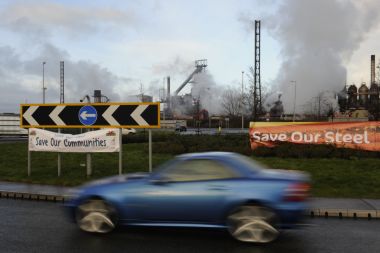Why don't Conservatives conserve things any more?

When is a conservative not a conservative?
It's not a joke, or a trick. It's one of the most pressing political questions in the US and the UK.
It's been brought into focus this week by the possible closure of the Tata Steel plant in Port Talbot, South Wales. The multinational company Tata said it was going to sell its UK operation and there's a real possibility that this will mean the loss of thousands of jobs and real devastation for the community.
There are loud calls for the UK government to step in and, if necessary, temporarily nationalise the Port Talbot plant to ensure the skilled jobs aren't lost and the knock-on effects for the local economy and community are mitigated. But these calls have so far heeded little. Right-leaning opinion formers say the plant must be allowed to die. That it would be 'inefficient' to do otherwise, that the market has decided and that's all there is to it. The executive director of free market think tank the Adam Smith Institute said, "The only justification for nationalisation is if we're prepared to say there is nothing that the people of Port Talbot could conceivably do productively... To be fair, there may be a grain of truth in that."
It's a pattern we've been used to over the last 50 years in the UK and the US. Deindustrialisation on a massive scale has seen places like Port Talbot abandoned to their fate. Whole swathes of blue collar Britain and America have been disgarded by what one commentator described as, "a perfect storm of automation, declining union power, and free-trade agreements."
That this process has taken place is undeniable. From Port Talbot to Detroit, the story is the same. Once mighty industrial areas have had the heart ripped out of them. In the words of Bruce Springsteen's 2012 song Death To My Home Town, "They destroyed our families, factories, and they took our homes... The greedy thieves who came around and ate the flesh of everything they found."
What is surprising is that this destruction began and has taken place under the watch of 'conservative' politicians on both sides of the Atlantic. When Margaret Thatcher's election as Prime Minister in 1979 in the UK was followed by Ronald Reagan's victory over Jimmy Carter, suddenly, there was a dramatic new dawn. The New Deal was dead. The post-war consensus over.
Instead, these two politicians, whose supporters still lionise them as conservative heroes, set about a radical programme of change. Taxes were cut, regulations were slashed, monetary policy was paramount and privatisation of public institutions was rapid. As Mrs Thatcher proclaimed, this was more than merely a set of budgetary measures. "Economics are the method: the object is to change the soul," she proclaimed.
Thus the pattern was set for the next 35 years. The astonishing popularity and electoral success of Reagan and Thatcher (and to a lesser extent Bush and Major) meant that the new consensus was never really broken by the Democrats or Labour.
These new economic orthodoxies drove almost everything that these giants of conservative politics did. Yet the effects of their new agenda were anything but conservative. Those communities which had passed down jobs from generation to generation were ripped apart. Wealth was accrued by the elites of Wall Street and the City of London. Mutuals, symbols of community and reciprocity for generations, were dismantled. Social Housing was privitised and not replaced, leading to the current housing crisis we find ourselves in. As Maurice Glasman said, "We had this mad market fundamentalism under Margaret Thatcher, the abandonment of any conception of the common good, the enormous transfer of wealth from poor to rich - it was horrible." The concept of the common good, which is drawn from Christian social teaching, isn't just the preserve of the left. The whole point is that conservatives should (and many do) care about the wellbeing of all, rather than just slavishly following the diktats of the market.

This abandonment of the common good, the sacrifice of local communities to the vicissitudes of the gods of 'the market', the prioritising of the financial over all other spheres of life should be anathema to true conservatives. The clue is in the name. Conservatives value family, community, the local, heritage, tradition, institutions. All of these were ripped up by Thatcher and Reagan's economic fundamentalism.
Instead of the true conservatism championed by giants like Michael Oakeshott and Edmund Burke, the last four decades of conservative rule in the UK and US has led to the triumph of global mega corporations over every day life and our local communities. As Tory MP Jesse Norman has written, Burke warned of the dangers of allowing big business to dictate our lives. "In his own time, Burke regarded as his greatest achievement his campaign to restrain the crony capitalism of the East India Company, and to insist on the accountability of private power to public authority."
In other words, the father of conservative thought took on a global corporation and helped to bring it to heel. Compare and contrast that with the government's weak response to the steel crisis in Port Talbot. Watch this video and tell me it's 'conservative' to shut down the steel plant.
In the face of the potential devastation of the local community, we get little but platitudes from the 'conservative' government. Time and again, contemporary 'conservatives' show their disregard for values of restraint, respect for institutions, family, faith and community. From the devastating economics of Reagan and Thatcher, to the contempt for those campaigning to keep Sunday Special, to the current crisis in the steel works of Port Talbot, so many of the policies of our modern conservative governments are deeply, bafflingly, unconservative.











